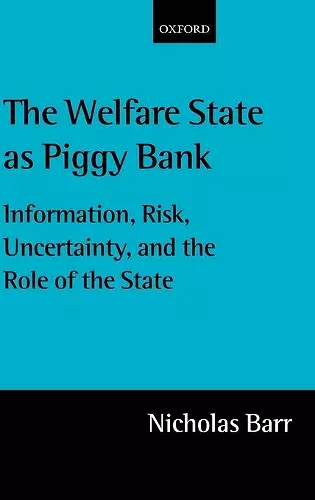The Welfare State as Piggy Bank
Information, Risk, Uncertainty, and the Role of the State
Format:Hardback
Publisher:Oxford University Press
Published:10th May '01
Currently unavailable, and unfortunately no date known when it will be back

Of the many functions of the welfare state, two are particularly prominent: the 'Robin Hood' function - the provision of poverty relief, the redistribution of income and wealth, and the reduction of social exclusion; and the 'piggy bank' function - ensuring mechanisms for insurance and for redistribution over the life cycle. The piggy-bank function, unlike the redistributive purpose of the welfare state, has received relatively little attention, and is not widely understood. This book redresses the balance. Nicholas Barr's central contention is that---contrary to popular opinion---the welfare state exists for reasons additional to poverty relief. These reasons - encapsulated by the piggy-bank function - arise out of pervasive problems of imperfect information, risk, and uncertainty. Even if all poverty and social exclusion could be eradicated, people would still need to insure themselves and to redistribute over the life cycle. As a result, Barr argues, the welfare state is here to stay, since twenty-first century developments do nothing to undermine these reasons. He also explores ways in which the welfare state can and will adapt to economic and social change, including specific, and sometimes novel, solutions. The analysis in "The Welfare State as Piggy Bank" is international, applying to advanced industrial countries, as well as addressing post-communist countries, and touching upon middle-income developing countries. Barr's approach is contemporary and forward-thinking. His discussion ranges over a number of topics of central relevance to life in the twenty-first century, including genetic screening and its impact on insurance; the convergence of private and social insurance; how to finance long-term care; pension reform in the light of fluid family structures and a mobile workforce; loans for financing investment in human capital; and new ways of involving private finance in tertiary education.
Presents a cogently argued account of the principles underlying Welfare State policies and their practical consequences ... I have not seen the economic and public policy distinction between compulsory and post-compulsory education set out so clearly and convincingly before. * Judith Marquand, Mansfield College, Oxford, Journal of Public Policy *
The book is a fruitful blend of economic modelling and institutional analysis ... An impressive feature is the author's discussion in each section of "twenty first century issues" and the final part of the book on "The Welfare State in a Changing World" ... this book goes to the heart of the economic issues surrounding the welfare state, and stimulates the reader to further thought. * Tony Atkinson, Nuffield College, Oxford *
If I were asked to design a social policy course from scratch ... I would certainly include Nicholas Barr's book as a key text ... this is a stimulating and successful text, a good example of the contribution economic analysis can make to social policy teaching and study. * Rudolf Klein, London School of Economics and London School of Hygiene, Social Policy *
Barr's book can be strongly recommended to anyone with an interest in the development of social policy ... Excellent and timely. * Sir Howard Davies, Times Higher Education Supplement *
ISBN: 9780199246595
Dimensions: 243mm x 165mm x 22mm
Weight: 580g
316 pages